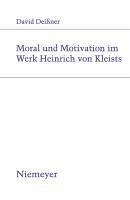The study demonstrates how Heinrich von Kleist's work can be understood as a literary translation of an engagement with the problems of moral philosophy from the Enlightenment. Received wisdom has it that with his life's crisis in 1801 Kleist turned his back on the philosophy of the Enlightenment and became a poet of the irrational and abyssal; in opposition to this, the present study shows that it is above all a philosophical problem to which Kleist turns in his writings until the abrupt end of his creative work - the question of whether man can be motivated to action by moral principles.
Dieser Download kann aus rechtlichen Gründen nur mit Rechnungsadresse in A, B, BG, CY, CZ, D, DK, EW, E, FIN, F, GR, HR, H, IRL, I, LT, L, LR, M, NL, PL, P, R, S, SLO, SK ausgeliefert werden.

